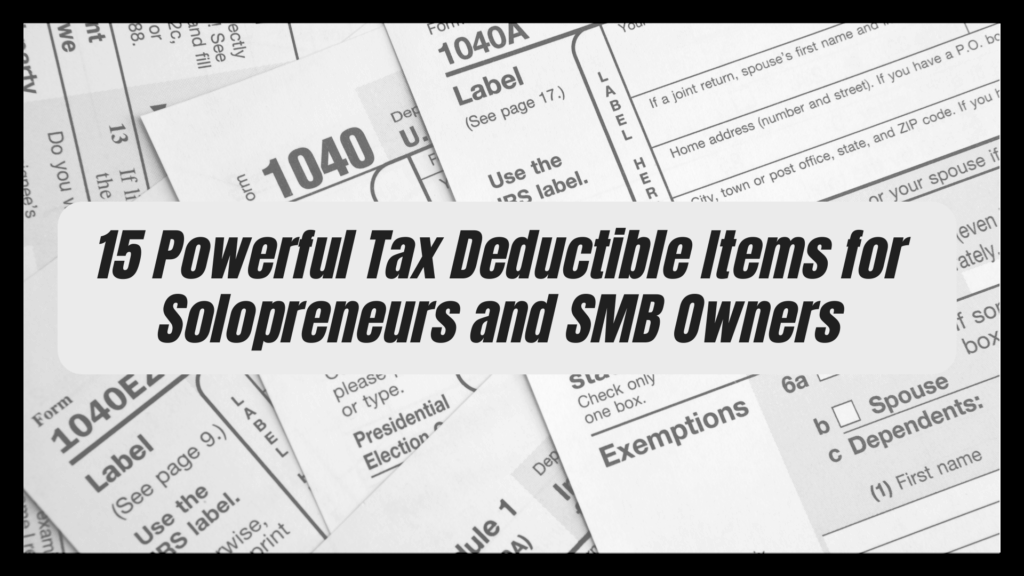Entrepreneurship is one of the smart paths to accelerate the pace of narrowing the economic gap. In the current digitally connected world, work opportunities are increasing to either run a self-employed business or work from home as a freelancer. However, venturing into this entrepreneurial lifestyle is a challenge and requires work, time, and organization skills to strategize, plan and run the business, with the objective of making self-sustaining earnings.
15 Common Tax Deductions that can Help:
The Fujn team has thoroughly researched and compiled a list of common tax deduction benefits applicable for freelancers and self-employed professionals:
1. Rent/Mortgage for home office — If you are a freelancer working from home, and have a specifically designated area for working, which is not used for any personal purpose then you are eligible to claim a tax deduction on that. The IRS allows self-employed persons to deduct the portion of their mortgage/property tax/rent that goes towards a home office. Otherwise, if you lease a workplace area, you’ll be able to deduct the rent paid for that particular area.
2. Cost of Utilities — Freelancers working from home are entitled to deduct a portion of utility costs as a home office expense. This includes the cost of gas, heating, air conditioning, broadband, and phone bills. The portion of the utility cost that is tax-deductible is directly proportional to the portion of the occupancy of office space in your home.
3. Startup costs and Incorporation costs — Business start-up costs are the expenses incurred to plan, scope, and launch a new venture, while organizational costs include the costs of creating a corporation, LLC, or partnership. The IRS allows a tax deduction for $5,000 in business startup costs and $5,000 in organizational costs. The $5,000 deduction is reduced by the amount, in case the total start-up costs or organizational costs exceed $50,000. For instance, if the startup cost is $52000, then the total deduction gets reduced to $3,000. The common startup expenses include market analysis, advertising, travel, surveys, training, promoting, legal/professional charges, and accountant costs.
4. Advertising and marketing — To sustain and survive in this cluttered digital world, self-employed professionals and entrepreneurs are required to actively market their brands and businesses. The IRS permits to deduct such expenses including social media ads, google ads, sponsored content, print advertising in newspapers, magazines, and industry journals, content marketing costs, email, and social media marketing software, business cards, and so on.
5. Business travel and meal expenses. If you drive your car for work or some business meeting, then these expenses are tax-deductible. If you conduct most of your business from home, then any travel from home to client or job sites, meetings with colleagues or contractors, any workshops and other educational events, or regular business travel will be accounted for tax deduction. Moreover, any reasonable expenses on meals while traveling for business purposes are tax-deductible.
6. Bank fees — If you are a freelancer or running a business, first, we highly recommend you open a business bank account dedicated to your business if you do not have one. It keeps you organized and separates your personal expenses from those of your work. This account will naturally incur fees. These bank charges include ATM fees, maintenance fees, late fees, credit card membership fees, loan set up costs, wire fees, ACH fees …. etc.
7. Credit card processing fees — Any merchant processing fees payable on credit cards, for the payments accepted from the customers, can be written off. Merchant services fee includes mark-up fee, per transaction fee, authorization fee, PCI compliance fee, and statement fee.
8. Business Insurance: Depending on the nature and size of the business, most of entrepreneurs/self-employed professionals opt for an insurance plan to protect their business. This includes fire insurance, credit insurance, business vehicle insurance, or business liability insurance. Any premiums paid for insurance claims are fully tax-deductible.
9. Self-employment health insurance deduction — While most full-time employees receive their health insurance coverage through their respective organizations, this expense is self-paid by entrepreneurs. This premium can be significant and takes a heavy toll on your earnings. As per the IRS, all self-employed individuals are eligible for a special tax deduction for the cost of medical and dental insurance and qualified long-term care insurance for themselves, their spouses, and dependents. To claim the same, you need to meet certain conditions:
· The business reported net profits on Schedule C (Form 1040) or Schedule F (Form 1040). In case the business incurred a net loss, then you are not eligible for this deduction.
· You were not eligible to participate in any employer (including your spouse’s) subsidized health plan, irrespective of whether you participated or not.
10. Professional Development — As an entrepreneur or a freelancer, it’s important to constantly upskill yourself. To achieve the same, many entrepreneurs/ freelancers enroll in various classes, workshops, and educational seminars. The IRS allows freelancers to claim tax relief on any expenses related to professional development. Moreover, in case you are a proprietor and have subscribed to many magazines, journals, and books closely associated with your field, or paying any professional membership fees then these expenses are tax-deductible.
11. Website cost: Building an informative, functional, and mobile-friendly website has nowadays become a must for any business venture. Self-employed individuals and freelancers can claim a tax deduction for the costs related to their business websites, including web designer charges, hosting costs, domain fees, web building, and recurring annual costs.
12. Computer software and equipment costs — There are diverse fields for entrepreneurs and freelancers to work on, including photography, video editing, graphic design, coding, programming, documenting, or preparing research materials. Any expenditure on the equipment or computer software including cameras, lenses, lighting, film supplies, audio equipment, adobe professional, bookkeeping software, etc. is tax-deductible. The software purchases could be one-time or an ongoing subscription. The equipment is an item that provides benefits for several years. So, it is considered a capital expense, and depreciation is charged it.
13. Contractors — If you are outsourcing a particular task to an independent contractor, like a graphic designer or bookkeeper, then the contractor fee is tax-deductible. To claim this deduction, you must file a Form 1099-MISC, in case you are paying more than $600 in a tax year. In case the payment is made via credit card or PayPal, then it is the responsibility of the credit card processing company (or PayPal) to file a 1099-K.
14. License and Permits — In case there is a legal requirement to obtain some specific license to operate your business, then any such business or professional license cost is entitled to a tax deduction.
15. Retirement saving plans — For freelancers and self-employed professionals, any contribution made towards the retirement plan is absolutely considered as a business expense and is tax-deductible. The retirement saving plans usually include SEP-IRAs, SIMPLE IRAs, and solo 401(k).
Disclaimer for Entrepreneurs and Business Owners:
Please note that the above is not a comprehensive or detailed version but can give you a background and familiarity on this topic. A general way to examine whether an expense is tax-deductible is to assess whether it is an ordinary and necessary business expense. As per section 162(a) of the Internal Revenue Code, “a business expense is the ordinary and necessary expenses of carrying on a trade or business. An ordinary expense is one that is common and accepted in your trade or business. A necessary expense is one that is helpful and appropriate for your trade or business”.




